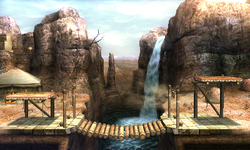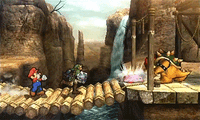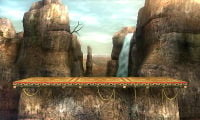Gerudo Valley: Difference between revisions
No edit summary |
(Added tournament legality info.) |
||
| Line 33: | Line 33: | ||
Gerudo Valley Omega.jpg|[[Final Destination (SSB4)|Ω Mode]] | Gerudo Valley Omega.jpg|[[Final Destination (SSB4)|Ω Mode]] | ||
</gallery> | </gallery> | ||
== Tournament Legality == | |||
This stage is universally banned because of the walk-off blast lines. The breaking bridge can severely affect gameplay. | |||
==Origin== | ==Origin== | ||
Revision as of 21:08, October 21, 2015
| Gerudo Valley | |
|---|---|
 
| |
| Universe | The Legend of Zelda |
| Appears in | SSB4 (3DS) |
| Availability | Starter |
| Crate type | Normal |
| Tracks available | Gerudo Valley Ocarina of Time Medley (Alternate) |
| Article on Zelda Wiki | Gerudo Valley |
Gerudo Valley[1] (ゲルドの谷, Gerudo Valley) is a stage in Super Smash Bros. for Nintendo 3DS. The stage is set in the Gerudo Valley area, which first appeared in The Legend of Zelda: Ocarina of Time. It is one of two stages from the Zelda universe in Super Smash Bros. for Nintendo 3DS, alongside Spirit Train. This is where Ganondorf is unlocked.
Layout
The Gerudo Valley stage is fairly long, being a mostly flat, grounded stage. The stone and natural flooring serve as solid platforms, and a bridge crosses the chasm between the two stretches of land. Two canopies stand on each piece of land, providing soft platforms for characters to stand on.
The central bridge can be destroyed by attacking it, similarly to the floor of Green Hill Zone, allowing characters to fall into the chasm below. Below the bridge, two very small platforms protrude from each side of the chasm, which can also be broken by attacks. When the bridge breaks, the bottom blast line moves downwards to compensate. After a while, the "Song of Time" will be heard and the bridge will repair itself. In earlier versions of the game, characters could be suddenly KO'd if they were under the bridge when it reformed, due to the blast line being moved back upwards. This has been changed in Version 1.0.5; players are now given time to recover before the camera returns to the default position.
Koume and Kotake (both voiced by Yayoi Jinguji) also appear as stage hazards. Kotake will attack the left side of the stage using fire, while Koume will attack the right side using ice, which can freeze characters. A desert wind will blow across the stage, for aesthetic effect. The colour scheme of Gerudo Valley is generally brighter than it was in The Legend of Zelda: Ocarina of Time.
Ω Form
In Omega mode, the stage has the current Gerudo symbol as a floor design. Walk-off blast lines are removed and Koume and Kotake do not appear.
Tournament Legality
This stage is universally banned because of the walk-off blast lines. The breaking bridge can severely affect gameplay.
Origin
Gerudo Valley first appeared in The Legend of Zelda: Ocarina of Time, being an area that would lead to Gerudo's Fortress and the Haunted Wasteland; however, the visual design of the stage comes from the Nintendo 3DS remake The Legend of Zelda: Ocarina of Time 3D.
In this stage, two canopies, which were not present in Ocarina of Time, can be seen on both sides of the bridge. The river, Zora's River, can be seen flowing through the canyon walls; however, the water level is much higher than it was in Ocarina of Time, and the waterfall is also much higher. In Ocarina of Time, the Gerudos guarded, and eventually destroyed, the bridge to ward off intruders. Carpenters then set up a tent nearby to repair the bridge, but are later captured by the Gerudos and are held captive in Gerudo's Fortress. After Link rescues them, the bridge is finally repaired. In this stage, the carpenters' tent can be seen near the bridge. The bridge in this stage is intact at first, but can be destroyed. The bridge was also made out of wood planks in Ocarina of Time rather than wood logs. In the background can be seen Gerudo's Fortress and the Horseback Archery Range near the fortress.
Kotake and Koume, together known as Twinrova, are witches that first appeared in Ocarina of Time as the boss of the Spirit Temple. They are sisters that have magic powers; Kotake's being ice based, and Koume flame based. During the boss battle, they use their ice and flame power respectively to fight Link. They also appeared as a boss in The Legend of Zelda: Oracle of Ages and Oracle of Seasons in a somewhat similar fashion as in Ocarina of Time. In this stage, Kotake and Koume appear as stage hazards by using their ice and flame powers.
When Ocarina of Time was first released, the Gerudo symbol used to represent the Gerudo tribe was a star and crescent, but was replaced with a different symbol in future ports of Ocarina of Time such as Ocarina of Time: Master Quest, its release on the Virtual Console, and Ocarina of Time 3D. The original symbol was removed due to its resemblance to the Islamic symbol. While the new symbol was used to replace the star and crescent, it first appeared in The Legend of Zelda: Majora's Mask for the Gerudo Pirates and has appeared in numerous Zelda games since to represent the Gerudo tribe.
Gallery
- GerudoValley3DS.png
Full view of the stage. Note Kotake and Koume flying in the air, and also note the spikes towards the bottom of the canyon.
- GerudoValley3DS 2.png
Ice spikes emerging from the ground from Koume's ice attack.
- GVBridgeDestroyed.jpg
The bridge destroyed, with the left side of the stage set on fire by Kotake's attack.
- Gerudo Valley.png
A battle takes place on Gerudo Valley.
A finished Time match on Gerudo Valley.
References







